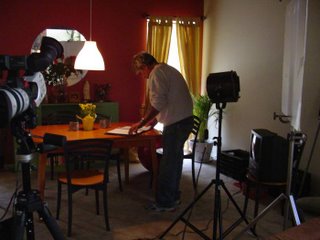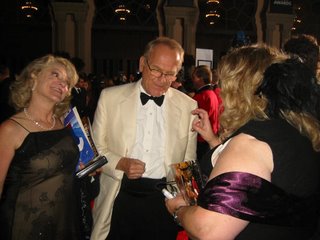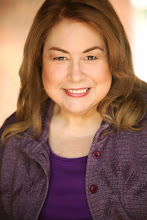Crystal - Thespian

That's how a friend and fellow writer addressed an email he sent to me after I had told him I'd been asked to play a role in a colleague's short film.
I have never fancied myself as an actor. Growing up, I was quite shy, although I did okay, one on one. Speaking up in front of crowds... I died the proverbial thousand deaths... so of course, I'd wind up with the lead role in school plays... in which I'd have to imagine I was playing to bunny rabbits to get through. (Imagining the audience to be naked comes much, much later.) Somehow I'd go into a state that wasn't me because people would actually say I was funny and should be a comedian. Hah!
At the time, I just assumed people who wanted to be actors were far more extroverted than I was and that's why they enjoyed getting out in front of the audience. It just never crossed my mind that many of them were shy and loved being someone else out there on stage -- rather than themselves. Maybe that was my problem. I never wanted to be anyone else -- just richer, more famous, better looking, smarter, happier, wittier, a more talented writer, more athletic, and with a knock-out figure. But all that's another story.
Anyway, before I left Chicago, I did a narrative short film for an acquaintance, MARY VAN DEUSEN, who was making industrial films for, I think, IBM. I wrote a script on Native American crafts and artifacts because I had enough to use as props and knew a good deal about the topic. Or at least, as much as a non-Native American could. I loved writing the script, but not so much having to talk it to the camera. That experience pretty much convinced me which path I belonged on and which side of the camera to stay on, although years later, a kind actor viewed the tape of my performance and said I was being too hard on myself -- that I wasn't as bad as I thought I was -- that I did okay for a first time in front of a camera. And I thought: actors can be pretty kind when you're letting them sleep on your couch during filming.
So despite knowing that I die the proverbial thousand deaths in front of the audience and know which side of the camera I belong on, what do I do when I come out here? I get a part-time job as a Paramount page, where one of the duties is to give tours of the lot. In other words, talk in front of a group of people. I boned up on Hollywood folklore and haunted the Paramount lot until I knew every nook and cranny of it. And to my shock, people actually liked my rap. Guys, like from the props department, would stop working and embarrass me by listening in -- they seemed to find my spiel amusing. I think it must have started when I was trying to explain what can be done with filming and I told my group that I wasn't real but a hologram projected... I don't know what got into me that day...
Okay, as a Paramount page, I was forced to admit that maybe, just maybe, I was okay with performing in person in front of a crowd. Maybe I could actually do theater -- get up on stage and be okay. But film? No way, no how, no, no, no, no, no.... I don't even like to be photographed. Did I try theater? Well, I stage managed.... but never ever did I try auditioning.
 So what could be more bizarre than a filmmaker member of our networking Table which has actors of all sizes, shapes, and ages, JIM METROPOLE, (pictured to the left as the director preparing to block my big scene) coming up to me and saying that he sees me in a role he wants to write? If he writes it, will I play it?
So what could be more bizarre than a filmmaker member of our networking Table which has actors of all sizes, shapes, and ages, JIM METROPOLE, (pictured to the left as the director preparing to block my big scene) coming up to me and saying that he sees me in a role he wants to write? If he writes it, will I play it?Now like everyone else who works in the business, I'm always looking for work and I had promised myself I wouldn't say no to any opportunities that presented themselves. But this... have to say, I thought the Man Upstairs was having a great chuckle.
Assuming that Jim meant only a one- or two-line throwaway part -- like a washerwoman or something -- I said, sure, I'll do it. Imagine my shock when he handed me a script where I play a lawyer, Tiffany Maple, in a ten-page scene, loaded with dialogue because I'm talking lawyerly things. Large blocks of dialogue like his mentor was... Shakespeare. Who did Jim think I was -- Michael Shanks or Amanda Tapping?
And it's the comic relief of the heavy drama piece to boot. Is the Man Upstairs laughing at me or what?
However, I was also touched by Jim's confidence in me to do the role he saw me in. And his confidence never wavered. Which of course meant that I had to do well to pay back that trust.
 The first big milestone was the table read. Fortunately, when I worked on JOAN OF ARCADIA, I got to attend table reads for our episodes and they were a great learning opportunity.
The first big milestone was the table read. Fortunately, when I worked on JOAN OF ARCADIA, I got to attend table reads for our episodes and they were a great learning opportunity.There are two kinds of actors: there are those who just read the dialogue straight and save their performances for the set. Sometimes you even wonder how they got the job they read it so blandly, until you see them do it for real.
The second type of actor performs while he's reading and those are the most fun. They make the table read zing and fun. It also allows them to try out things, especially little shifts in dialogue or additions while they are 'performing'.
The director and writers and executive producers are all at the table listening. And sometimes, if they like the subtle change or adlib, they'll revise the script right then to reflect it. It also gives the writers a chance to learn if something is not working and change it before the actors start acting and you waste time and money having to redo it. One example comes to mind... in one table read, JOE MANTEGNA stumbled over a word -- it actually stopped him dead in the reading. As soon as that happened I realized that the word wasn't right for a street cop. When I read it in the script earlier, it didn't bother me because it was by definition correct usage, but for an academic or highly literate person, not the idiom of a street cop. The writers obviously realized it, too, because that word was replaced that day with a more idiomatic word in cop street talk for Joe to do when they actually filmed the scene. And he performed it brilliantly.
So here comes my first table read and what should I do? Should I read it straight because we were just reading it? Should I just read it so the director can hear the words and worry about my performance later? Or should I perhaps try to do it in character -- the over-the-top, bombastic, enthusiastic, vivacious personality Tiffany Maple seemed to be in the script? She fairly lept off the page with her big personality.
I decided to do 'her' and see how they liked my interpretation. After all, I had nothing to lose. If Jim hated it, well, whoever said I wanted to be an actor. ("I'm a writer, not an actor, Jim.") And if he wanted something else, I'd have time to work on a different interpretation.
To my delight, Jim loved it, he was laughing hard, and kept on saying "That's it, but bigger. Bigger." So I'd give him bigger... and then bigger. And he'd laugh even harder. ELISSA KERHULAS, our dark-haired lead actress who's pictured with me above, was also laughing at the right bits. In fact, they were so delighted with how I was doing Tiffany and were so supportive of me, that it was easy to do, easy to just go with, easy to have fun with. And their encouragement was so embracive for me that when I have to go from that bubbly high to devastated, in the space of a line due to a shocking revelation, I hit my mark. To my surprise, I actually hit my mark. It was in that moment I felt like I was really an actor, acting. And that I could really do this.
They must have felt it, too, because they chuckled with delight that I had hit it so well -- that I had given Tiffany her real moment. It was awesome, and I couldn't have done it without their encouragement and protection. Instead of freezing up like the shy person in me would expect to do, I was able to go for it, because of them.
When we were done, they were very sweet with the praise, saying I should look for work on a sitcom -- that I had the comedic flare for it. And why wasn't I acting? Why didn't I have an agent? Questions I never thought in a million years would be directed at me. Ever. We were all in a good, boisterous mood because the table read had gone well, and it all worked.
Nevertheless, my cautious soul reminded me: that was done reading the script. Now I had to be able to walk and talk at the same time. I had to memorize those pages and pages of long dialogue and I'd have to be able to regurgitate them along with all the stage directions we worked out and all the inflections in the voice and all the over-the-top, boisterous, enthusiatic personality she has. Without stumbling over my tongue. Was I up to the challenge?
Jim kept assuring me I was -- that I would do great. I wasn't worried about the coverage shots, except whether I could remember to do the exact same thing each time. I was worried about the master shot. The way I saw the scene was my character comes charging into Elissa's house with her good news about her case and she almost doesn't let Elissa get a word in edgewise. All I could see was having to be able to spout off ten pages of dialogue in one go to get the master. And if I flubbed up, we'd have to start from the top.
Jim kept assuring me that that wasn't how he was going to film and that I didn't have to have it all memorized at once. That I'd be fine. What I didn't take into consideration in my anxiety was that while my dialogue seemed like an endless stream of words, I was entering at the door, rushing through the living room to the dining room table and then out again in those ten pages -- and those are all camera moves. In the one hour scripts I'm used to working with, those would all be written either as individual scenes or individual shots, like:
she flies through
THE LIVING ROOM
hell-bent, and sets her briefcase down on
THE DINING ROOM TABLE
And even dummies like me would recognize those as individual set-ups. Jim had used a shorthand for all this since he was both the writer and the director. He knew how he was going to direct it as he wrote it. So he was right in that I didn't have to be able to spout the ten pages in one go.
However, not realizing this while I was anxiously learning my lines, I memorized the entire thing to do in one go. I acted it out with stage directions in my house, with all the nuances of expressions and body movement I wanted to give the character. A friend volunteered to run lines with me and so we did that one afternoon and I recited lines to myself whenever I drove to the store.
So now we come to today, shooting day. This morning, I had my usual Sunday breakfast with my aunt and cousin. My cousin is in music, a rock-n-roll singer, so he decided to test me. I handed him the script and he ran lines with me. To my amazement I had it completely memorized. Was I going for overkill or what?
I arrived on our set before our director because Jim was out doing last minutes things for the shoot. This wasn't a problem because Elissa and I had not had time to run lines together. I specifically wanted to show her what I had in mind doing, so she would be able to follow me, and I could see what she planned to do so I could follow her. Somewhere I had in mind that this is what actors do.
She disconcerted me by saying that the director would change everything in blocking, so she was quite content to run lines sitting in the comfort of the living room couch. Well, I understood he would tell you where to stand and later may change how you deliver something, but I thought the stage directions were pretty clear from the script and dialogue. And while I haven't made a film before, I've script coordinated enough series to not notice any huge changes in the actions designated by the scripts I prepared.
It turned out that we were both right. Jim did make some changes that I had to adjust for. And yet, I also got most of what I had planned in because the basic actions dictated by the script action lines and the dialogue remained intact.
Filming was a lot easier than I expected. And a lot more fun. Tiffany was a great and fun character to play. When I realized we had to break the scene up into the camera moves, I relaxed considerably. I knew I could do this. Trust in my director. He was right when he said it would be okay. Like all actors, I also had to trust that he was getting what he wanted. That what I was delivering was what he wanted, because I couldn't see myself doing it. After all, my job was not to look into his monitor. And of course, we did several takes -- rehearsing and rolling film. But when all was said and done, he seemed to like what we did, what I did. He seemed to feel it would all cut together nicely -- the master shots and the close-ups. And hence, I accomplished what I set out to do, which was pay him back for his confidence in me by giving him the performance he had envisioned when he had asked me to do it.
It'll be a while before he's done with the rest of the film and then he has to edit it and put in all the touches a film needs. So it'll be a while before I get to see what I did and how I did. To see if I cringe or am delighted with seeing myself. After all, you hear some actors say they check out their own work and some say they don't like to watch themselves. We'll see later which category I fall into. Right now all I have to go on is Jim's still unwavering enthusiasm when he says I did great -- and how much fun the filming turned out to be. And now, as a result, I can add another hyphenate to my name: actor.
As for the future, it would be a cliche to say, "Mr. DeMille, I'm ready for my close up" so all I'll say is: "Next?"


